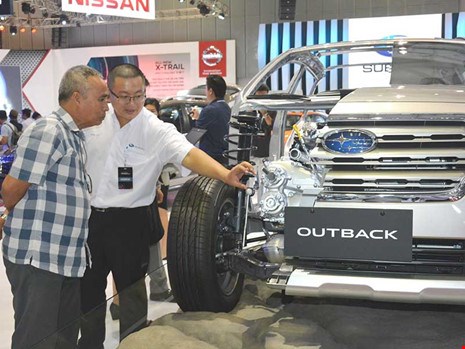Vietnam has spent four years to prepare for the application of Euro 4 emission standards, but many problems still exist.
In early 2017, the Euro 4 emission standard will be applied in Vietnam. Automobile manufacturers must equip vehicles with good engines which reduce smoke, dust and toxic gas.
Le Minh Duc, director of a car import company, said he applauds the decision to apply the Euro 4 emission standard. He said there is no problem for car dealers to apply the standard early next year.
Tran Tan Trung, director of Lien A International, the distributor of Audi in Vietnam, said though products are better with Euro 4 and Euro 6 standards, buyers don’t have to pay more money for the cars.
Euro 2 cars are made in smaller quantities, while Euro 4 and Euro 6 standard cars are manufactured on a large scale. Therefore, the prices of Euro 4 and Euro 6 cars are not higher than Euro 2 despite the higher standard, Trung explained.
| Vietnam has spent four years to prepare for the application of Euro 4 emission standards, but many problems still exist. |
From 2017, the cars with the cylinder capacity of less than 1.5 L will enjoy a 5 percent luxury tax cut, which will also help reduce the prices of the models.
With Euro 4 standard, consumers can use better cars, and enjoy more utilities and a cleaner environment.
However, analysts have recently voiced their concern about the feasibility of the plan to apply Euro 4 standard, pointing out that the fuel available in Vietnam may not be compatible with Euro 4 vehicles.
The representative of a car import company in HCM City said his company was continuing to import Euro 2 cars because there is no suitable fuel for Euro 4 cars in Vietnam.
“In the past, we had RON 88 and RON 92 petrol. And RON 95 petrol appeared recently,” he explained.
“Euro 4 engines are designed to have different fuel injection and exhaust systems compared with Euro 2. And the gas filtration system is also different,” he explained.
An observer noted that RON 95 is the best petrol now, but it is sold only in large cities. In small provinces, very few filling stations have this petrol to sell because of low demand.
According to the Ministry of Science & Technology, nine non-lead petrol products can be sold in the market, namely RON90-II; RON92-II; RON95-II; RON92-III; RON95-III; RON98-III; RON92-IV; RON95-IV; RON98-IV.
The number II, III and IV represent fuel standards in line with the emission standards.
The petrol meeting the IV standard has the maximum lead content of 0.005 g/l, while the figure is higher at 0.013 g/l for II standard.
While the lead content in IV standard is no more than 50 mg/kg, the figure could be 10 times higher for II standard.
Thanh Mai / vietnamnet